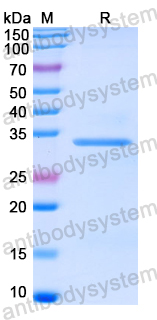Catalog No.
YHJ47701
Expression system
E. coli
Species
Homo sapiens (Human)
Protein length
Asp571-Ala849
Predicted molecular weight
33.23 kDa
Nature
Recombinant
Endotoxin level
Please contact with the lab for this information.
Purity
>90% as determined by SDS-PAGE.
Accession
Q99959
Applications
ELISA, Immunogen, SDS-PAGE, WB, Bioactivity testing in progress
Form
Lyophilized
Storage buffer
Lyophilized from a solution in PBS pH 7.4, 0.02% NLS, 1mM EDTA, 4% Trehalose, 1% Mannitol.
Reconstitution
Reconstitute in sterile water for a stock solution. A copy of datasheet will be provided with the products, please refer to it for details.
Shipping
In general, proteins are provided as lyophilized powder/frozen liquid. They are shipped out with dry ice/blue ice unless customers require otherwise.
Stability and Storage
Use a manual defrost freezer and avoid repeated freeze thaw cycles. Store at 2 to 8°C for frequent use. Store at -20 to -80°C for twelve months from the date of receipt.
Alternative Names
PKP2, Plakophilin-2
Low expression of miR-7-5p promotes resistance to radiotherapy in lung cancer through direct upregulation of PKP2 expression., PMID:40374728
Arrhythmogenic Cardiomyopathy PKP2-Related: Clinical and Functional Characterization of a Pathogenic Variant Detected in Two Italian Families., PMID:40282378
Genomic and molecular evidence that the lncRNA DSP-AS1 modulates Desmoplakin expression., PMID:40236443
Computational Modeling of Effects of PKP2 Gene Therapy on Ventricular Conduction Properties in Arrhythmogenic Cardiomyopathy., PMID:40201954
The Future of Clustered Regularly Interspaced Short Palindromic Repeats (CRISPR)-Cas9 Gene Therapy in Cardiomyopathies: A Review of Its Therapeutic Potential and Emerging Applications., PMID:40130092
Natural History and Clinical Outcomes of Patients With DSG2/DSC2 Variant-Related Arrhythmogenic Right Ventricular Cardiomyopathy., PMID:40123482
Predicted Risk of Ventricular Arrhythmias in a Genome-First Population With Genetic Risk for Arrhythmogenic Right Ventricular Cardiomyopathy., PMID:39989366
[A case of biventricular involvement of arrhythmogenic right ventricular cardiomyopathy associated with PKP2 gene variation]., PMID:39965856
TAX1BP3 Causes TRPV4-Mediated Autosomal Recessive Arrhythmogenic Cardiomyopathy., PMID:39963794
Coexistence of cardiac sarcoidosis and arrhythmogenic cardiomyopathy-associated genetic variants: a multicentre case-control study., PMID:39837597
Computational Modeling of Effects of PKP2 Gene Therapy on Ventricular Conduction Properties in Arrhythmogenic Cardiomyopathy., PMID:39764031
Interleukin-1β Drives Disease Progression in Arrhythmogenic Cardiomyopathy., PMID:39763850
Electrophysiological Phenotype-Genotype Study of Sustained Monomorphic Ventricular Tachycardia in Inherited, High Arrhythmic Risk, Left Ventricular Cardiomyopathy., PMID:39611258
Adipocyte-Mediated Electrophysiological Remodeling of PKP-2 Mutant Human Pluripotent Stem Cell-Derived Cardiomyocytes., PMID:39595168
Liquid-Liquid Phase Separation in the Prognosis of Lung Adenocarcinoma: An Integrated Analysis., PMID:39506421
Atrial cardiomyopathy resulting from loss of plakophilin-2 expression: Response to adrenergic stimulation and implications for the exercise response., PMID:39446303
Robotic manipulation of cardiomyocytes to identify gap junction modifiers for arrhythmogenic cardiomyopathy., PMID:39441897
Exploring novel natural compound-based therapies for Duchenne muscular dystrophy management: insights from network pharmacology, QSAR modeling, molecular dynamics, and free energy calculations., PMID:39415830
Prevalence, Penetrance, and Phenotypic Manifestation of Cardiomyopathy-Associated Genetic Variants in the General Population: Insights from a Mayo Clinic Biobank Study., PMID:39387793
Generation of human induced pluripotent stem cell lines UKJi001-A and UKJi006-A from patients with heterozygous mutation in the PKP2 gene., PMID:39332132
Chemical structures and immunomodulatory activities of polysaccharides from Polygonatum kingianum., PMID:39245127
Restoring PKP2 in arrhythmogenic cardiomyopathy., PMID:39196151
Plakophilin 2 gene therapy prevents and rescues arrhythmogenic right ventricular cardiomyopathy in a mouse model harboring patient genetics., PMID:39196150
Animal Models and Molecular Pathogenesis of Arrhythmogenic Cardiomyopathy Associated with Pathogenic Variants in Intercalated Disc Genes., PMID:38892395
PKP2 induced by YAP/TEAD4 promotes malignant progression of gastric cancer., PMID:38804704
Molecular genetic screening after non-ischaemic sudden cardiac arrest and no overt cardiomyopathy in real life: A major tool for the aetiological diagnostic work-up., PMID:38670870
AAV9:PKP2 improves heart function and survival in a Pkp2-deficient mouse model of arrhythmogenic right ventricular cardiomyopathy., PMID:38499690
Engineered tissue geometry and Plakophilin-2 regulate electrophysiology of human iPSC-derived cardiomyocytes., PMID:38476404
Rare-variant collapsing and bioinformatic analyses for different types of cardiac arrhythmias in the UK Biobank reveal novel susceptibility loci and candidate amyloid-forming proteins., PMID:38390584
Generation of CRISPR/Cas9 edited human induced pluripotent stem cell line carrying the heterozygous p.H695VfsX5 frameshift mutation in the exon 10 of the PKP2 gene., PMID:38382214
Crossing the Threshold of Therapeutic Hope for Patients With PKP2 Arrhythmogenic Cardiomyopathy., PMID:38328964
AAV-Mediated Delivery of Plakophilin-2a Arrests Progression of Arrhythmogenic Right Ventricular Cardiomyopathy in Murine Hearts: Preclinical Evidence Supporting Gene Therapy in Humans., PMID:38288614
Biallelic PKP2 loss of function variants are associated with a lethal perinatal-onset biventricular dilated cardiomyopathy with excessive trabeculations and ventricular septal defects., PMID:38050058
Understanding Arrhythmogenic Cardiomyopathy: Advances through the Use of Human Pluripotent Stem Cell Models., PMID:37895213
MYH10 activation rescues contractile defects in arrhythmogenic cardiomyopathy (ACM)., PMID:37833253
Downregulated expression of plakophilin-2 gene in patients with colon adenocarcinoma predicts an unfavorable prognosis and immune infiltrate., PMID:37726168
[Analysis of PKP2 gene variants in a child with Arrhythmogenic right ventricular cardiomyopathy]., PMID:37643967
Left-dominant arrhythmogenic cardiomyopathy due to desmoplakin mutation: a case report., PMID:37632291
Impaired Plakophilin-2 in obesity breaks cell cycle dynamics to breed adipocyte senescence., PMID:37607954
Spatiotemporal cell junction assembly in human iPSC-CM models of arrhythmogenic cardiomyopathy., PMID:37595583
Identification of novel gene signature for lung adenocarcinoma by machine learning to predict immunotherapy and prognosis., PMID:37583701
The Novel Variant NP_00454563.2 (p.Glu259Glyfs*77) in Gene PKP2 Associated with Arrhythmogenic Cardiomyopathy in 8 Families from Malaga, Spain., PMID:37510372
Screening for Rare Coding Variants That Associate With the QTc Interval in Iceland., PMID:37449562
The pyruvate dehydrogenase complex regulates mitophagic trafficking and protein phosphorylation., PMID:37442609
Body surface potential mapping detects early disease onset in plakophilin-2-pathogenic variant carriers., PMID:37433034
A Systematic Analysis of the Clinical Outcome Associated with Multiple Reclassified Desmosomal Gene Variants in Arrhythmogenic Right Ventricular Cardiomyopathy Patients., PMID:37418234
Generation of two edited iPSCs lines by CRISPR/Cas9 with point mutations in PKP2 gene for arrhythmogenic cardiomyopathy in vitro modeling., PMID:37393721
Downregulation of cardiac PIASy inhibits Cx43 SUMOylation and ameliorates ventricular arrhythmias in a rat model of myocardial ischemia/reperfusion injury., PMID:37014755
Desmosomal protein degradation as an underlying cause of arrhythmogenic cardiomyopathy., PMID:36947592

